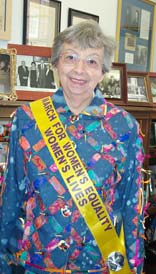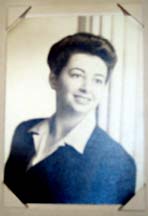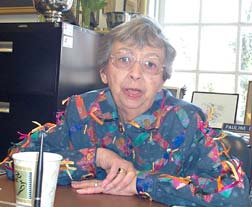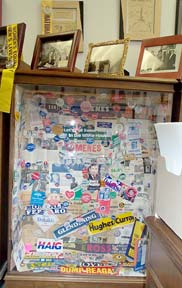
Volume 12, Issue 12 ~ March 18-24, 2004
 Bay Weekly Interview
Bay Weekly InterviewDelegate Pauline Menes
Living History for Women’s History Month
interviewed by Sandra Olivetti Martin
In the Maryland House of Delegates, Pauline Menes, who turns 80 on July 16, holds seniority honors. Our longest continually serving delegate was a reformer in 1966 when she was elected to represent Prince George’s County. Back then the word feminist — if used at all — likely meant one of those suffragettes who fought for women’s right to vote back in the early days of the 20th century.
Menes [say menis] certainly didn’t think herself a feminist. Nor, a decade before the coinage of the slogan A Woman’s Place Is in the House and Senate, did it occur to her that as a woman she ought to know her place. When Menes joined up with a bunch of good-government Beltway upsurgents, the 30-something wife and mother never imagined it would lead her not only to 38 years in the Maryland Statehouse but also to earning Maryland women the right to work as equal partners with men.
She’s done just that in the House of Delegates, where a powerful speaker sacrificed his future to a bit of potty humor at his female colleague’s expense. Menes has also championed equality in houses all over Maryland. A pioneer in the causes that used to be called women’s issues but are nowadays recognized as everybody’s concern, she brought legislative attention and remedies to child abuse, domestic violence, rape and stalking.
We caught up with Menes in her office in the Lowe House Office Building, an ironic location, as you’ll read. The sign on the door says Parliamentarian, for Menes is the House authority on Mason’s Rules, which guide the legislative body’s deliberations. Inside, Menes works amid a miniature museum, created by special assistant Grace Mary Brady to chronicle the times that her boss has lived and shaped.
Skipping lunch, the petite, sprightly delegate hurried on to the House Judiciary Committee, where she joined a majority of delegates in refusing a Maryland constitutional amendment defining who has the right to marry.
Bay Weekly What are you working on this session?
Pauline Menes The other day I had bills up on acupuncture. The ear is the area in acupuncture that controls addictions. We’ve discovered, because of all of my work as chair of the Special Committee on Drug and Alcohol Abuse, that there are very useful purposes for auricular acupuncture in drug and alcohol detoxification. It does not do away with the craving, but it reduces it enough that individuals can get into treatment and have better outcomes.
This has been going on in the Oriental world for a long time. A number of states moved when they heard about the positive results. Three years ago, we in Maryland encouraged people to get trained in the auricular area for detoxification of addictions.
What we want really is to have acupuncture available to the community so that someone who realizes they have a problem can go to their local auricular detox acupuncturist and start on the road to treatment. We want it in our jails and prisons because many of the people are in there because of their problems with drug or alcohol abuse.
Bay Weekly What happens next?
Pauline Menes I’m optimistic it will pass in both the House and the Senate. Then the governor will sign the bill, and that will keep auricular detox acupuncture as a permanent program in Maryland.
Bay Weekly It wasn’t always so easy for you to do business in the Maryland House of Delegates.
Pauline Menes No, it wasn’t. The people who were in power here when I was elected didn’t think that I should be here, didn’t think that any of us women should be here, and had no concept what our contribution could be. They pretty well let us know that we were not going to be very successful. We were low on the totem pole, and the men saw very little reason for us to climb that pole.
Bay Weekly That’s a story we want to hear. But first, tell us how you came to be elected in 1966.
Pauline Menes I was part of a new group who had moved to Washington for the war effort during World War II and then had stayed. I was always interested in supporting good candidates, and I supported and helped them in any way I could. The Democratic Party in Prince George’s County was then controlled by a small group of what I always called the landed gentry, people who had lived in the county for many years.
We younger Democrats saw ourselves as agents of change. With the 1962 election approaching, we decided to put together an entire ticket for the primary. We were going to get the public involved in changing the leadership of Prince George’s County.
That was a very long ballot, from legislature down to register of wills. The ticket required 40 candidates; getting people to fill them was a tough job. When the leadership was almost down to the bottom of the list — and I was far from the leadership — they turned to me and said, “Pauline, you gotta be on the ticket, too.” I said there was no way I could run, I’ve got young children.
At home I said to my husband, “You’ll never guess what happened to me tonight.” I laughed, but Mel said he didn’t think it was so funny. He said I’d be great. “We’d work out taking care of the children. Tell them you’re going to run.”
Well, I did. I ran for register of wills with a group we called Independent Democrats in 1962. In the end, our group took more than half of the positions on the ballot.
Bay Weekly Did you win?
Pauline Menes I came very close, 144 votes or so, to the incumbent. I did not win in 1962, but we took over the leadership in the Central Committee. So in 1966 when the next election came around, many people in office said, “Pauline, you’ve got to run.”
We had gone through redistricting, which gave us a number of new House and Senate seats here in Annapolis. I was lucky enough to run for an open seat; there was no incumbent. So in 1966, running again with those I had worked so hard with in ’62, we ran a very successful campaign and won.
Bay Weekly Those years were a tremendously powerful era for the country, spanning the election and assassination of John Kennedy and the ascendancy of Lyndon Johnson. Was there a particular point of empowerment for you in the ’60s when you’d gone from mother and housewife to delegate?
Pauline Menes The very fact that there were women on the ticket was unique. Those who put the ticket together realized that women had a legitimate place in setting policy and being office holders and representing women. One leader was Carlton Sickles, who had served in Annapolis and in Congress. His thinking that women were equals permeated our group. I think if we had each run individually, I probably would not have won. There was still not the recognition that women belonged anywhere but in the home.
Bay Weekly Tell us about yourself in those years.
Pauline Menes I had three young girls and a very supportive husband who thought anything I was desirous to do, he would help. Over the years, I collected for every charitable association in existence and was active in our civic association, and he was always ready and willing to step in so I could go out and knock on doors. My home life was very supportive.
My husband was an accountant, a professional strengthening his ability to support the family and a good father who saw his role as being a partner. In those days, there were very few men who saw their role as being a partner.
When I came here, I found that the few women who were here had support from their immediate family and that was a very significant element in why they were here.
Bay Weekly As a young woman, did you see yourself as a progressive seeking social justice?
Pauline Menes I don’t think I saw myself as that. I thought everybody thought the way I did. I didn’t give myself a political tag. It was only when I began serving in the political arena that I realized that my objectives were different.
Bay Weekly How many women sat in the legislature then?
Pauline Menes We were a dozen in the House and Senate.
Bay Weekly Is there a moment that characterizes your standing?
Pauline Menes Oh yes. I think the breaking point in women’s patience to be accepted and given acknowledgment came when I was asked by the women to go to the Speaker and complain about the fact we had no ladies rest room. To go to the bathroom, we had to go across the common area in the Capitol building and use the public rest room behind the steps.
Not only was it inconvenient, but when we were in session we had to leave whatever was going on to run across there.
Bay Weekly And the men?
Pauline Menes The men had a lounge off the chamber, and off the lounge was a very commodious men’s facility. In the Senate chamber there was a small room they turned into a ladies room after they had women senators. It was behind locked doors, and we women delegates could not get to that room as only senators were allowed to enter.
Bay Weekly So women delegates were in a tough position.
Pauline Menes We were in a very tough position. Mainly because we encountered the public and lobbyists in the hallway that we had to cross in order to go to the bathroom. They would stop us, and unless you were very much in need of speed you couldn’t help but stop. They would talk to you about what you were voting on, which was very improper.
Bay Weekly And you were elected to remedy the problem?
Pauline Menes I agreed to go to Thomas Hunter Lowe, who was the speaker, and explain to him what our problem was. For a brief time, he got us keys to the locked door that let us into the Senate ladies room. But we still had to cross the entire floor of the Capitol to get to it.
I ended up telling him that he would have to find some better way to accommodate us. He thought long and hard, and his answer was to appoint me to the chair of the Ladies Rest Room Committee.
 Bay Weekly This is the same Lowe for whom this building is named?
Bay Weekly This is the same Lowe for whom this building is named?
Pauline Menes Yes.
Bay Weekly Do you think he meant this appointment as an insult?
Pauline Menes Ordinarily an appointment is made in a letter. I have his letter of reappointment the second year:
This is to inform you that you have been reappointed chairman of the ladies rest room for the legislative session of 1972. I know that you will serve in this capacity with your usual efficiency and effectiveness.
Very truly yours, Thomas Hunter Lowe.
Bay Weekly But your first appointment was unconventional?
Pauline Menes Thomas Hunter Lowe took the opportunity in 1971 to make the announcement from the rostrum during a regular session of the House. He also had a boxed fur-covered toilet seat, which many of us had seen sitting in his office, that some of the rural legislators had given him.
We recognized this box in his hand when he said from the rostrum, “Del. Menes, I’d like to give you this.” And he started to come down with this box in his hand.
I took my microphone and said, “Mr. Speaker, please stay where you are. I’d be more than happy to come up.” And I went up to the rostrum.
When I got to the rostrum, I said, “This is a very unique opportunity, the first time that any of us are aware that a woman has stood on the rostrum during a session of the legislature.”
With that, he pulls partially out of the box this fur-covered toilet seat and hands it to me.
Bay Weekly How did that go down?
Pauline Menes I put the box in my desk, and we all left, a lot of people commiserating with me and some complimenting me for what I had said.
But the press told the world what had happened in Maryland. And the women and some of the younger men who understood the role of women in modern times came down on Thomas Hunter Lowe’s head and chastised him. Thomas Hunter Lowe was planning on running for a federal senate seat, and this ended his candidacy.
The public was absolutely outraged. This was the beginning of the women’s movement, and this potty humor hit at just the wrong time.
Bay Weekly How was the rest room problem finally resolved?
Pauline Menes It was finally resolved when Speaker Ben Cardin had the men’s room in the lounge foreshortened, putting a wall in so that some of the accommodations became the women’s rest room. To this day, men and women go in the door from the lounge past the door that is now the women’s rest room, open another door and go into the area that is for the men. The men who’ve been elected since have no idea why.
Bay Weekly Are you now considered an equal partner with your colleagues, the delegates who happen to be men?
Pauline Menes I think so. I think we women always felt that we were equal — and in some cases superior — to the men we encountered down here. The change is that the men now see us as equal.
Bay Weekly How did that change come to be?
 Pauline Menes I think the public forced the change in thinking. The general public came to realize that there were many women with background and education and the ability to do things that were closed to them. And public office was certainly one of them. When we went out to campaign and met men and women, their eyes began to be opened with the competence we demonstrated and the type of issues we brought out that affected them.
Pauline Menes I think the public forced the change in thinking. The general public came to realize that there were many women with background and education and the ability to do things that were closed to them. And public office was certainly one of them. When we went out to campaign and met men and women, their eyes began to be opened with the competence we demonstrated and the type of issues we brought out that affected them.
One of the earliest was domestic abuse. We’d have women come ask us “What can I do?” They felt that they could talk to us about their problems. When we came back to session, we focused on their problems. They would not have told a man that their husband was brutal or abused children. But they felt comfortable telling another woman. Then they saw that the women they told these problems to were solving them. So they began to realize the value of having women come to Annapolis and serve as their representatives.
Bay Weekly Did you find that the same principle that helped you get elected, working with like-minded people, helped you achieve legislation that changed people’s lives?
Pauline Menes Absolutely. For one thing, we women still clung to each other, shared our experiences with each other, shared our ideas on legislation. We worked as a team very often. On child abuse, one of my early issues, Lucille Maurer [delegate and later the first woman state treasurer: 1987-1996] and I worked on a bill for three years running. The men didn’t see a need to work as teams, but we women did. Women had a different way of working that was very productive.
Bay Weekly Were your issues in that era ones that used to be called women’s issues?
Pauline Menes Yes, but we were very concerned that we would be seen as only involved with women’s issues, so we made a concerted effort to have some of us be involved in fiscal and other issues not seen as women’s issues. Many of the women had backgrounds in business and the professions, and as more women were elected, the area of our interests broadened. Today we have women in every one of our standing committees and with background and experience in all areas of life.
Bay Weekly From this acting together, the Women’s Caucus evolved …
Pauline Menes The Maryland Women’s Caucus referred back to the kind of treatment, and the kind of issues and the casualness of our reception. We were the first women’s caucus in the country. We formed out of the National Order of Women Legislators at the suggestion of Sen. Rosalie Abrams [delegate, state senator and first woman Senate majority leader] that we should form a caucus as a way to gather strength and talk about the legislation we were dealing with.
 We wrote a grant to the MS Foundation, which funded us for, I think it was $2,000, and hired a staff person and became an active women’s caucus. That was the beginning of what is now a bipartisan group of 63 women, House and Senate, and a very active legislative committee that takes positions that we all vote on. Now we’re one-third of the General Assembly, so our positions carry a lot of weight.
We wrote a grant to the MS Foundation, which funded us for, I think it was $2,000, and hired a staff person and became an active women’s caucus. That was the beginning of what is now a bipartisan group of 63 women, House and Senate, and a very active legislative committee that takes positions that we all vote on. Now we’re one-third of the General Assembly, so our positions carry a lot of weight.
By the way, we were the first in the nation. The National Women’s Caucus in Congress followed us. Now almost all the states have a women’s caucus.
Bay Weekly Over the years, you’ve introduced 2,060 bills, of which 709 have passed, for a 34.4 record. That makes you quite a good hitter. What have been your proudest achievements?
Pauline Menes Of my goodness: Like your children, I don’t know how you make a difference between them.
Child abuse, domestic violence, pension protection, stalking and rape legislation. Some of our legislation in years past dealt with rape in such a way that it was very difficult to get a prosecution and a guilty finding. We changed that. Now I’m working on Fetal Alcohol Syndrome.
Bay Weekly So all these particular protections for women and children would not have been in place had not women like yourself come into the legislature during the 1960s and ’70s and in increasing numbers thereafter?
Pauline Menes I think so. They may have come but much, much later because now many of the men are closer to our philosophy in terms of women’s participation.
Bay Weekly You also helped women achieve equal rights under Maryland law …
Pauline Menes Del. Charlie Blumenthal, a man with a very smart wife — who subsequently served after he retired — put in a state Constitutional amendment for equal rights for women in Maryland. We were the 10th state in the nation to get it in our Constitution.
 It was then clear that there needed to be a federal constitutional amendment. The bill finally got out of Congress, and the states needed to adopt resolutions supporting it. By that time, the anti-Equal Rights Amendment groups — women also felt very vulnerable and that by being equal they were losing certain protections — had organized. The federal Constitution was not amended, and to this day we do not have equal rights for women in our federal Constitution. But we do here in Maryland.
It was then clear that there needed to be a federal constitutional amendment. The bill finally got out of Congress, and the states needed to adopt resolutions supporting it. By that time, the anti-Equal Rights Amendment groups — women also felt very vulnerable and that by being equal they were losing certain protections — had organized. The federal Constitution was not amended, and to this day we do not have equal rights for women in our federal Constitution. But we do here in Maryland.
Bay Weekly In retrospect, how have you liked your job in the House these 38 years?
Pauline Menes I have loved it. I have found such gratification in the support of my constituency, that they allowed me to come back. I am now in my 10th term, and I have never had an election without competitors, both in the primary and general. Jumping in can be frightening, but once you’re in, that cold water can be very invigorating.
If you really want to get something important done, you have to be ready to work on it more than one year. Very often the most important things we do take a number of years. Enough time that I approach it like long distance running: You’ve got to pace yourself; you’ve got to be willing to go the long haul.
Bay Weekly To what do you attribute voters’ willingness to return you to office year after year?
Pauline Menes I think I’m lucky enough to have a constituency that pays some level of attention to what’s going on here in Annapolis and knows what I am pushing for, how I vote, what my interests are — and likes what I’m doing. They don’t always agree with me, but they appreciate the fact that I do what I do because I think it’s right.
 Bay Weekly So it’s a personal relationship you have?
Bay Weekly So it’s a personal relationship you have?
Pauline Menes I think to a great extent it’s a personal relationship.
Bay Weekly Why should we as citizens become voters and pay attention to what goes on in Annapolis?
Pauline Menes Municipal elections are important for people because they protect the quality of life in their home areas. But the broader issues are dealt with here in Annapolis. So it’s so important for people to take a responsibility on themselves for what goes on here. The only way you do that is by keeping up with the big issues. You don’t have to be interested in everything, but the big issues, you need to follow them, you need to tell your elected officials what to do to please you. Other than war and peace at the federal level, most of the things that affect people’s lives go on here at the state level.
Menes headlines Calvert County’s Women of the World luncheon March 20. See 8 Days a Week for details.
Last updated March 18, 2004 @ 2:00am.
